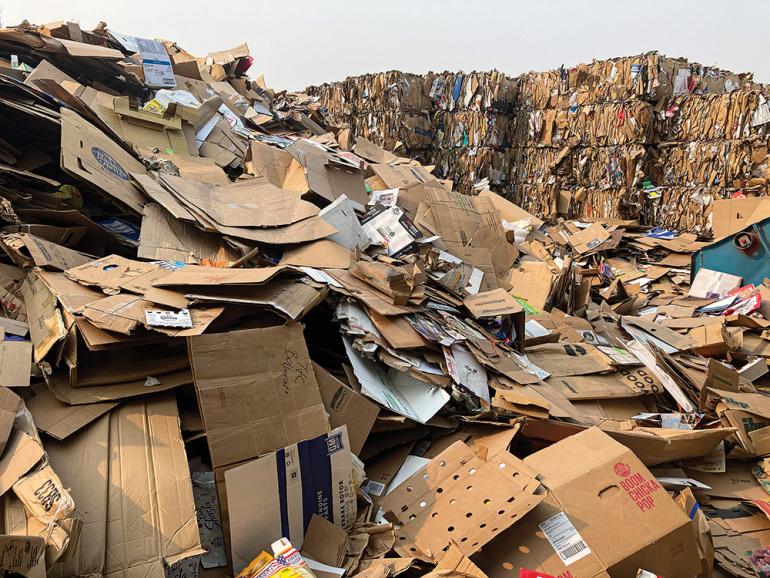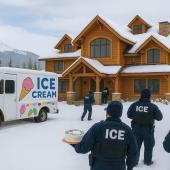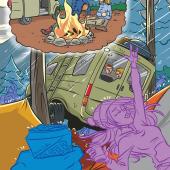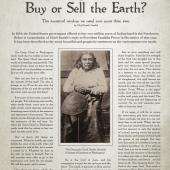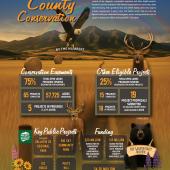Watching Your Waste
Perceptions and misconceptions of recycling in Bozeman.
If you could substantially reduce your greenhouse-gas emissions without a major lifestyle change or adding significant time or cost to your day, would you do it? Careful what you say, because there is already an easy, painless, and highly overlooked way to shrink your carbon footprint: create less trash. The disposable consumer lifestyle practiced in America is a grotesque aberration from the global norm—with the average American creating about seven pounds of garbage each day, we create more trash than anyone on the planet. Every single thing we put in the garbage started out as something that someone bought, and when we consider the material-and energy-intensive “life cycle” of our trash, starting off as raw materials, through manufacturing, shipping, consumer-use, and finally, disposal, our consumption and waste accounts for over 40% of our carbon footprint. With 2020 finishing up tied with 2016 as the hottest year on record, and last summer’s wildfires as a harbinger of what’s to come, it’s time for Bozemanites to get serious about climate change if we want to continue to enjoy epic powder, pristine trout-fishing, and the Rocky Mountain summers we all know and love.
Excess consumption and waste have become so normalized in American society that we are oblivious to it. We think nothing about scraping a bunch of leftover food into the trash when dinner is over. We don’t bat an eye when we order takeout and it comes in a box inside of a bag accompanied with 37 napkins and 14 disposable condiment packets. So many of us mindlessly throw trash “away,” not realizing that “away” is a place—part of an ecosystem—that will be irrevocably impacted by our gratuitous consumption and waste.
Here in Gallatin County, “away” is the Logan Landfill, and the 360 million pounds of trash we send there each year is not going away, ever. In fact, a landfill isn’t designed for materials to go away; it’s designed to store materials in a safe and sanitary manner over a long period of time. Landfills are highly engineered systems that are lined and capped to create a closed system for containing garbage. Materials deposited in a landfill don’t readily decompose, because dark, oxygen-starved environments are not conducive to sustaining decomposers like fungi, worms, and bacteria. Some products undergo limited decomposition, but since that decomposition involves anaerobic bacteria, methane gas is created as a byproduct. Methane traps 30 times more heat in the Earth’s atmosphere than carbon dioxide. Landfill emissions are the third leading source of human-related methane emissions in the United States.
Besides the climate change impacts and moral questions of leaving giant tombs of garbage for future generations (WALL-E, anyone?), the biggest tragedy of our trash is when we waste precious natural resources like wood, metals, oil, and water by sending things to the landfill that don’t belong there. We don’t have data for Logan Landfill, but EPA data show that 75% of our “trash” isn’t trash; it’s recyclable or reusable materials. Those aluminum cans you just tossed in the garbage? To make new ones, tropical forests are bulldozed to harvest bauxite, natural gas is burned to refine the mineral into alumina powder, and more fossil fuels are expended when it’s finally smelted into aluminum. Not to mention the emissions from shipping it across the ocean to our local shelves.
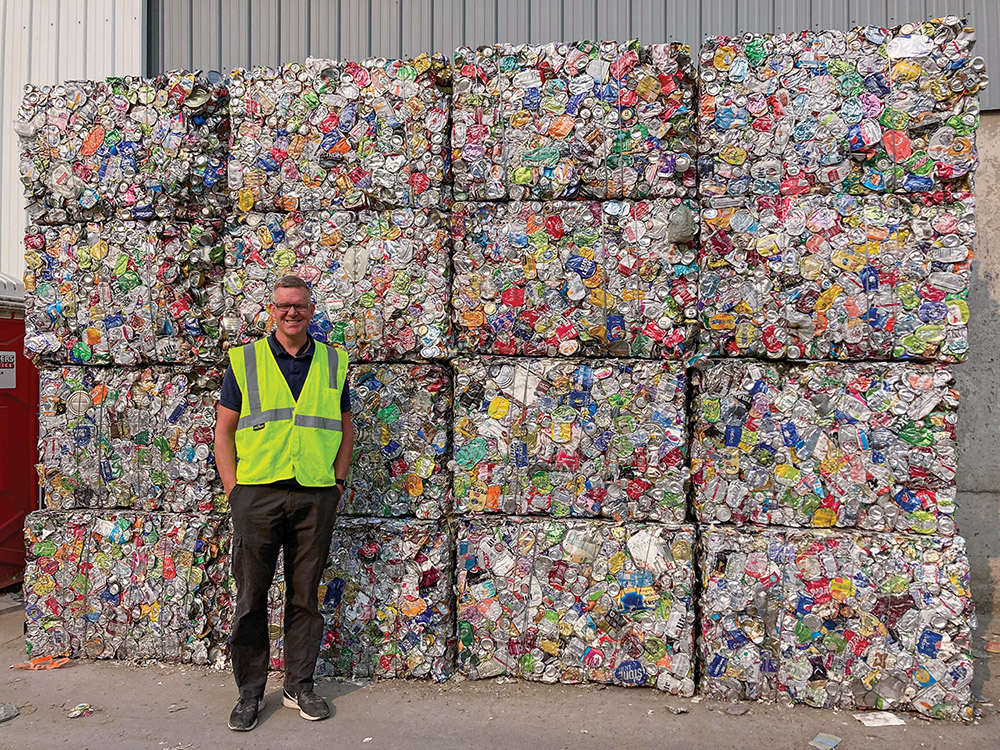
So what are some alternatives? Despite our rural location and long distance from recycling markets, Gallatin County is lucky to have a fairly robust recycling program that is highly subsidized. Basic materials like plastic bottles, cardboard, paper, and cans are collected by various entities (including 15 free drop-off locations sponsored by Gallatin County), and they all go to our local recycling facility, Four Corners Recycling. The materials are sorted into like-piles and shipped to various facilities around the U.S. where they are recycled into new products. Glass is not widely accepted in Gallatin County because we’d have to ship it all the way to Salt Lake City.
Recycling sounds good and dandy in theory, and many do-gooders assuage their environmental guilt by doing so, but it’s worth noting that recycling is not a perfect system. Sorting recyclables into bales of like-materials is difficult, and many well-meaning recyclers hurt this process by “wish-cycling,” or putting non-recyclable materials like yogurt tubs, plastic berry containers, and plastic bags into the bins. This contamination of the recycling stream is a serious problem in Bozeman where we have a lot of new residents and college students coming here from more urban areas that may have different recycling guidelines. When people throw non-recyclables into the bins, it contaminates the load, and more often than not, the entire batch will end up at the landfill. People think they are doing the right thing by “recycling” their plastic clamshell containers, but they are actually harming the entire process. Less is more when it comes to recycling. Keep it simple, and when in doubt, throw it out.
So, what’s a well-meaning Bozemanite to do? When it comes to consumption and waste, there are fewer barriers to positive choices. Anyone can ask to have their coffee in a “for here” mug, or choose to save their leftover food for later instead of throwing it out. Even an eight-year-old can commit to eating a “waste-free lunch” each day.
The bottom line when it comes to trash is that there is no realistic way around it: you and I are going to create trash. It’s okay to create trash—that’s why we have a landfill—but it’s not okay to fill that landfill with perfectly good materials that we could be re-using instead. Like most things in life, prevention is key. Because waste disposal is complicated and far from perfect, and because it takes so many resources just to manufacture all this “stuff,” we’re better off creating less waste in the first place—through reduced consumption, mindful shopping habits, and a culture of repair and re-use. As the World War II-era patriotic saying goes “Use it up, wear it out, make it do, or do without.” Fighting climate change will require a similar level of patriotism and cooperation, and focusing on our trash is an easy way to leave this planet better than we found it.
Alexis Alloway is the Municipal Contract Administrator for Republic Services in Bozeman. If you have questions about recycling or would like to have a free-waste reduction or recycling education program, contact her at [email protected].
Top 10 Ways to Reduce Your "Garbage Footprint"
Reduce, Re-Use, and Recycle
In that order. We always hear the three “R” words in that order because there’s a hierarchy. Recycling a sheet of paper is good, but re-use the back side of it first, and try to reduce paper usage altogether.
Reduce Food Waste
Buy less, eat leftovers, and freeze foods before they spoil. The average American family throws out 25% of the food it purchases. If food waste was a country, it would be the world’s third leading source of greenhouse gas emissions, after China and the U.S.
Unsubscribe from Junk Mail
The average American receives over 40 pounds of junk mail per year, decimating a collective 90 million carbon-absorbing trees in the process. If you’re getting unwanted mail, you can unsubscribe by contacting the company’s customer-service department, or by using a free service like catalogchoice.org to unsubscribe for you.
Buy Fewer Electronics
Manufacturing multi-material electronics like cellphones, laptops, watches, and computers has detrimental environmental impacts. These devices promote an inherently unsustainable economic model of planned obsolescence, and disposing of electronic waste is exceedingly difficult. Keep your cellphone for three years instead of two, and you’ll use ten fewer phones in your lifetime. That may not sound like a lot, but when you consider the other 3.5 billion cellphone users out there, we are talking some serious impacts.
Re-Use Paper
Using only one side of a sheet of paper seems to be a norm in our society. Start a “GOOS” (Good On One Side) bin in your home, classroom, or office. Make a pledge to never recycle a sheet of paper until both sides have been used.
Bring Your Own
Mug, shopping bag, Tupperware container, utensils, cloth napkin, you name it. Pick one frequently-used disposable item in your life and go on a mission to eliminate it. Once you master one product, build from there and see how many other disposable items you can eliminate.
Buy Used Instead of New
This will save you a lot of money, in addition to using fewer natural resources. If you’re a gear junkie, think about which items really need to be new to serve their purpose. For used gear, hit up second-hand stores and use the classifieds, both in print and online.
Compost
The whole reason that landfills generate heat-trapping methane is due to organic materials (mostly paper and food) being trapped inside. Sign up for curbside compost collection through Happy Trash Can or YES Compost, or start your own compost pile at home. Composting not only reduces landfill emissions, it recycles valuable nutrients through our ecosystem and promotes good soil health.
Recycle Properly
Know our recycling guidelines for Gallatin County (see republicservices.com). Be sure that all recyclables are empty, clean, and dry. When in doubt, throw it out—we would rather you produce less recycling of high-quality materials that actually can be recycled, rather than huge bins filled with mostly garbage.
Support “Green” Businesses
In the Gallatin Valley, trash is cheap, and responsible waste disposal costs more due to collection, processing, and transportation costs. Businesses that practice recycling and composting are taking a financial hit to do so. Shop at these businesses and avoid the ones that send valuable resources to the landfill. —Alexis Alloway


